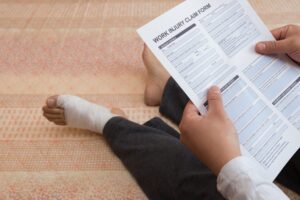A Guide That Explores Why It Is Important To Report Accidents At Work
Workplace accidents happen all the time, and no workplace is completely safe. In this guide, we will discuss the questions “Why is it important to report accidents at work?” and ”Who can make an accident at work claim?”
This guide begins with a look at the importance of reporting accidents and injuries in the workplace. We discuss what types of accidents at work are reportable to the Health and Safety Executive HSE, Great Britain’s workplace regulator for health and safety, and when a workplace injury should be reported. We then discuss when someone is eligible to make an accident at work claim and whether claims can still be made if you don’t report an accident at work.
Towards the end of this guide, we tell you how you could potentially make a compensation claim with our panel of No Win No Fee personal injury solicitors after suffering an injury or illness due to an accident at work.
Speak with our advisors today:
- Call 020 3870 4868.
- Fill out our claim online form.
- Send a message in the live support box.
Jump To A Section
- Why Is It Important To Report Accidents At Work?
- What Workplace Accidents Are Reportable?
- Who Can Make An Accident At Work Claim?
- Can I Make An Accident At Work Claim If I Did Not Report It?
- How Do You Claim For Your Injuries On A No Win No Fee Basis?
- Learn More About Why Is It Important To Report Accidents At Work When Making A Claim
Why Is It Important To Report Accidents At Work?
Here are some reasons why it is important to report accidents at work:
- To meet legal obligations, workplaces with 10 or more employees must, by law, have an accident at work book so that workplace incidents can be recorded.
- Preventing future accidents and injuries at work. Reporting an accident at work and how it happened can identify any hazards and risks. These can be removed or reduced to decrease the chance of that same accident happening again in the future.
- Improving workplace safety. To also avoid similar types of work related accidents happening again, new health and safety measures can be implemented to improve the overall safety of employees. This can include conducting risk assessments more regularly and updating workplace policies.
- When making a personal injury claim. If an employee is injured at work and wishes to make a personal injury claim, they can provide a copy of the record of the accident from the employer’s accident book as evidence for their case.
- Protecting the employer/company. Employers need to report certain incidents, injuries and near misses to the HSE; by alerting your employer to your accident, you are allowing them to fulfil their legal obligation.
What Workplace Accidents Are Reportable?
All accidents and injuries that happen while at work should be reported. This helps to not only improve workplace health and safety but also keep a valuable record of employee injuries; such information may be needed in the future. If you want to make a personal injury claim following an accident at work, having evidence such as a workplace accident report can be vital as it can prove when the injury occurred, how it happened, the cause of it and any subsequent injuries.
It is then the employer’s responsibility to assess which workplace accidents legally need to be reported to the Health and Safety Executive (HSE), Britain’s workplace health and safety regulator, under the Reporting of Injuries, Diseases and Dangerous Occurrences Regulations 2013 (RIDDOR). RIDDOR is the legislation that requires employers to report certain types of workplace accidents, illnesses and injuries.
As such, RIDDOR specifically highlights what types of workplace accidents and injuries should be reported to the HSE. These include:
- Serious injuries.
- Fatal accidents.
- If a visitor or other member of the public was injured and needed hospital/medical treatment.
- When a worker is incapacitated for more than seven days.
- Specific near-miss accidents.
- Gas incidents.
You can also view this HSE resource to read more about the specific reportable incidents.
Who Can Make An Accident At Work Claim?
An employee can make an accident at work claim if they can show that they suffered an injury or illness because their employer breached their legal duty of care.
The Health and Safety at Work etc. Act 1974 sets out the requirement that all employers must take reasonable steps to ensure the safety of their employees while they are at work.
Some reasonable steps include conducting regular risk assessments and providing adequate workplace training.
Thus, if an employee has an accident at work and it was due to the employer not fulfilling their duty of care, then the employee could have valid grounds to make an accident at work compensation claim.
So, here are the criteria that all need to be proven by an employee if they wish to begin claiming compensation for their accident at work:
- An employer owed a duty of care.
- This duty of care was breached.
- Due to this breach, an employee suffered a workplace injury or illness.
If you have a chat with our advisors, they will be able to tell you whether you are eligible to make a workplace accident claim and more about the claims process.
Can I Make An Accident At Work Claim If I Did Not Report It?
As we have mentioned before, it is important to report accidents in the workplace, as the recordings made in the accident log book can be used as evidence if you wish to claim compensation. However, there is other evidence that you could also collect to prove employer liability for your workplace accident and to show the severity of your suffering. These include:
- CCTV footage of your accident.
- Photographs of any visible injuries you have sustained and of the immediate accident scene.
- Witness contact details.
- Copies of your medical reports. You should seek medical attention as soon as possible after suffering a workplace injury or illness. Medical reports can show the extent to which you have been affected by an employer’s breach of duty of care.
- A personal symptoms and treatment diary.
- Receipts, bank statements, and payslips that show what financial losses you have suffered due to your workplace injury or illness, such as a loss of earnings.
If you are put in touch with one of the solicitors from our expert panel of personal injury specialists, they could help you collect this evidence as part of their services. So, speak with an advisor today to see whether you have a valid accident at work claim and can be put in touch with one of the personal injury claim solicitors from our panel.
How Do You Claim For Your Injuries On A No Win No Fee Basis?
If you have an eligible accident at work claim a solicitor from our panel could offer to represent you with a No Win No Fee agreement in place. They use a Conditional Fee Agreement (CFA) as their choose of contract.
When working with a solicitor under a CFA, you will not have to pay for their services:
- Before the personal injury claims process commences.
- While the case is being worked on.
- If the personal injury claim is not a success, you will not be required to pay any fee for the solicitor’s services.
If your claim is successful, a success fee will be deducted from your compensation. Success fees are a percentage. Legally, there is a cap on the maximum success fee percentage to ensure that the majority of the compensation goes to you.
How To Start A Claim
If you have been in an accident at work and wish to enquire about a potential compensation claim, contact our team. By speaking with us, you can receive advice on what you can do next given your circumstances and potentially be connected with a No Win No Fee personal injury solicitor from our panel.
- Call 020 3870 4868.
- Fill out our claim online form.
- Send a message in the live support box.
Learn More About Why Is It Important To Report Accidents At Work
Here are our similar guides:
- Find out the time limits for an injury at work claim to see whether you are within the claims limitation period.
- Learn how you could sue on behalf of someone else if someone you know has been injured in an accident at work.
- Read our guide on the process of calculating compensation for a successful accident at work claim.
Alternatively, we think that these external resources may be of use to you:
- HSE – find out how to make a RIDDOR report online.
- Citizens Advice – their advice on what to do if you’re injured because of an accident at work.
- Gov.UK – whether you can claim Statutory Sick Pay (SSP) if an injury or illness has led to time off work.
- More from the HSE about reporting dangerous incidents under the Reporting of Injuries, Diseases and Dangerous Occurrences Regulations 2013 RIDDOR.
Hopefully, we have answered some of your questions, such as “Why is it important to report accidents at work?”. Our team is available 24/7 for a free consultation. So, please don’t hesitate to speak with us if you have any questions at all.









